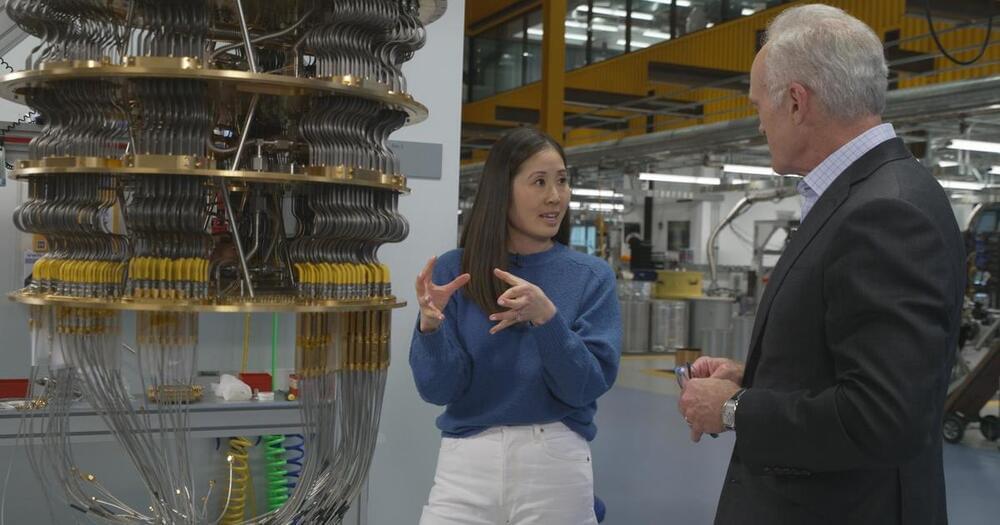This is the BEST and most complete deep dive on the financial models for Tesla’s 11 major business units! James from InvestAnswers comes with data and analysis of the seasonality of Tesla stock showing its volatile movement as it compares to the macro economy and the S and P 500. Together we adjust the assumptions and metrics in his dynamic financial model. Come join us! The spreadsheet used in the video will be made available to everyone once James finalizes it first James runs a very successful YouTube channel called InvestAnswers where he shares insights on financial freedom, real estate, crypto, stocks, and options.
Category: economics – Page 48
Prepare Our Kids for Life, Not Standardized Tests | Ted Dintersmith | TEDxFargo
As a leading venture capitalist, Ted Dintersmith lived and breathed the world of innovation. He has seen first-hand how quickly automation is eliminating the structured jobs in our economy, as well as the opportunities for young adults who are bold, creative, and entrepreneurial. As Ted shifted his focus to the future of our schools, he realized that the core purpose of our schools has been lost in a wave of testing, data, and accountability. In this talk, Ted underscores the potential for our kids and our country if we educate to our innovative and creative strengths, and trust our schools and teachers to prepare our kids for life, instead of for standardized tests.
After a twenty-five year career in venture capital, Ted Dintersmith is now focused on issues at the intersection of innovation and education. In the fall of 2012, Ted served as part of the delegation representing the United States at the United Nations General Assembly, where he focused on global education and entrepreneurship. The first two films he executive produced – Most Likely To Succeed and The Hunting Ground – premiered at Sundance, 2015. His website http://www.edu21c.com describes his initiatives and he can be followed @dintersmith.
Ted is a Partner Emeritus with Charles River Ventures, a leading early-stage venture capital firm. Independent industry analysts ranked Ted as the top-performing venture capitalist in the United States for the 1995–99 period. Ted earned a Ph.D. in Engineering from Stanford University, and his undergraduate degree from the College of William and Mary, where he earned High Honors in Physics and English.
This talk was given at a TEDx event using the TED conference format but independently organized by a local community.



IBM & Meta Launch the AI Alliance for Safe, Open AI
In an era where artificial intelligence (AI) is reshaping the contours of technology, a groundbreaking initiative has emerged: the AI Alliance. The alliance is a consortium of leading organizations spanning various sectors — industry, academia, research, startups, and government–united in their commitment to fostering open innovation and open science in AI.
Created by IBM and Meta, the AI Alliance is a testament to the belief that open and transparent innovation is crucial for harnessing AI advancements in a way that prioritizes safety, diversity, and widespread economic opportunity.
At the heart of the AI Alliance’s mission is creating an open community that accelerates responsible AI innovation while ensuring scientific rigor and trust. The effort is action-oriented and distinctly international, reflecting the global nature of AI’s impact.

Ego, Fear and Money: How the A.I. Fuse Was Lit
The people who were most afraid of the risks of artificial intelligence decided they should be the ones to build it. Then distrust fueled a spiraling competition.

A Sports Analogy for Understanding Different Ways to Use AI
The potential impact of generative AI on the economy, society, and work is polarizing, swinging from the positive benefits of a technological revolution to doomsday scenarios. The authors have come to think about this issue as points on a spectrum and have created a sports analogy to help think about it: AI tools can range from steroids, to sneakers, to a coach, each representing a different relationship between human users and the technology. Steroids elevate short-term performance, but leave you worse off in the long term. AI-powered tools can instead be used to augment people’s skills and make them more productive — much like a good running sneaker. On the most desirable end of the spectrum, AI-powered tools can be used like a coach that improves people’s own capabilities. This framework can be used to help conceptualize how we might craft AI-based tools that enhance rather than diminish human capabilities.
Page-utils class= article-utils—vertical hide-for-print data-js-target= page-utils data-id= tag: blogs.harvardbusiness.org, 2007/03/31:999.368607 data-title= A Sports Analogy for Understanding Different Ways to Use AI data-url=/2023/12/a-sports-analogy-for-understanding-different-ways-to-use-ai data-topic= AI and machine learning data-authors= Jake M. Hofman; Daniel G. Goldstein; David M. Rothschild data-content-type= Digital Article data-content-image=/resources/images/article_assets/2023/11/Nov23_22_200404124-001-383x215.jpg data-summary=
Will next-gen tools be used as a steroid, sneaker, or coach?

Quantum computers could solve problems in minutes that would take today’s supercomputers millions of years
“We’re looking at a race, a race between China, between IBM, Google, Microsoft, Honeywell,” Kaku said. “All the big boys are in this race to create a workable, operationally efficient quantum computer. Because the nation or company that does this will rule the world economy.”
It’s not just the economy quantum computing could impact. A quantum computer is set up at Cleveland Clinic, where Chief Research Officer Dr. Serpil Erzurum believes the technology could revolutionize the world of health care.
Quantum computers can potentially model the behavior of proteins, the molecules that regulate all life, Erzurum said. Proteins change their shape to change their function in ways that are too complex to follow, but quantum computing could change that understanding.
The global battle over microchips | DW Documentary
Computers, cars, mobile phones, toasters: countless everyday objects contain microchips. They’re tiny, unremarkable and cheap, but since the outbreak of the coronavirus pandemic, they’ve been at the center of a political and industrial tug of war.
Against the backdrop of the trade war between China and the US, “The Microchip War” spotlights all the aspects of this conflict. In the film, the world’s most influential actors in this industrial sector weigh in.
No one is in any doubt that microprocessors are as strategically important as oil. The battle over microchips could potentially redefine the geopolitical world order. In the United States and Europe, fears over a microprocessor shortage have led to a flood of investment pledges. After ceding microchip production to Asia in the 1990s, market leaders in the West are now trying to bring production back home and thereby regain control of the production chain.
This resulted in the adoption of new legislation in 2022: the European Chips Act initiated by the EU Commission under Ursula von der Leyen and — in response to this — the American “Chip and Science Act” initiated by Joe Biden. China, the US, Europe: major global powers fighting over tiny microchips. Pandemic and resource scarcity have fueled the desire for industrial reconquest and economic superiority.
But is this reindustrialization actually possible? Can the West challenge the foundations of globalization in this way?
#documentary #dwdocumentary #usa #europe #asia.